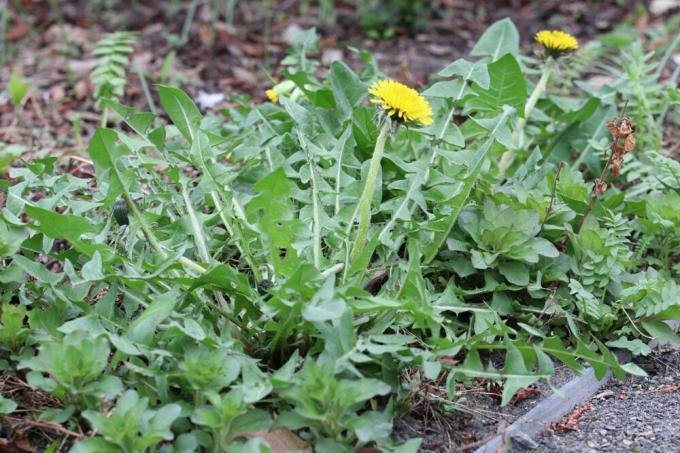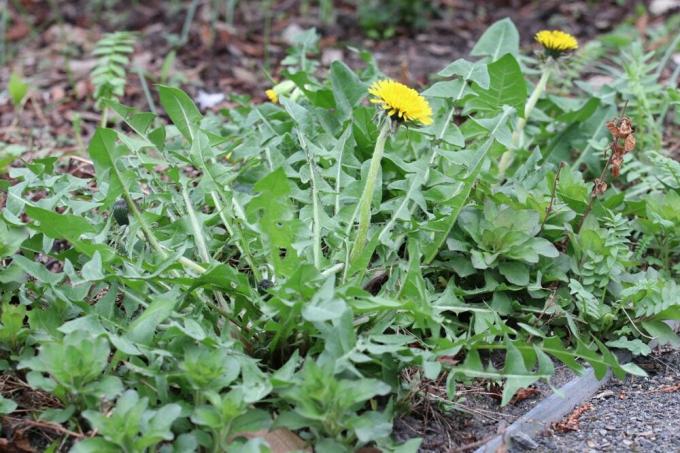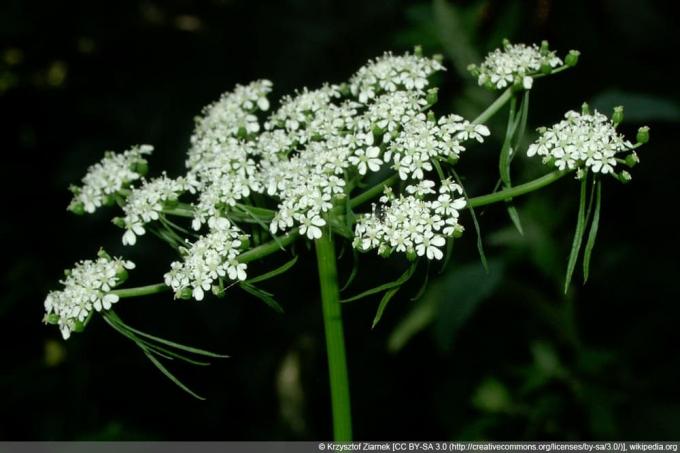

Table of contents
- Application
- Best time
- additives
- restrictions
- vinegar essence
- How effective is vinegar?
- Annual weeds
- Perennial weed plants
- Joints between paving stones
- alternatives
- prevent weeds
- Groundcover as natural weed protection
- Conclusion
For gardening, vinegar can be used as a natural weed killer. The substance that makes vinegar aggressive against weeds is called acetic acid. The higher the acetic acid content in vinegar, the deadlier it is to plants. Normal table vinegar used in the home for salads and the like has a relatively low percentage of acetic acid (5 to 6%). Vinegar essence contains 25% acetic acid and is therefore much more concentrated. However, the use of vinegar against weeds is by no means as harmless as is generally assumed.
Application
If you want to fight weeds naturally, you should take a closer look at the unwanted plants in advance. Vinegar and vinegar essence are not a miracle cure and do not act selectively only on weeds. Before you spread vinegar indiscriminately in your garden and cause more damage than you really want, you should consider the following tips:
- only use in small amounts
- Treat weeds before sowing
- the younger and smaller the plant, the more effective the vinegar is
- this is how you prevent a new generation of plants
- Depending on the weed, only multiple applications usually help
- Timing: spring and summer
- only spray or brush directly onto the respective weed
- also remove flowers and seeds
Tip:
Some gardeners swear by briefly boiling the vinegar before treating it and spraying it over the plants while it is still hot. This has the advantage that the heat also causes problems for the plants. Finally, hot water also kills the cells of the plants.
Best time
Check out the weather forecast for your area and wait for a couple of sunny days to come. Then, at the start of this period, spray or brush the vinegar onto the plants you want to control. There are two important reasons why treatment should take place in dry and sunny weather conditions:
- As much vinegar as possible needs to stick to the leaves for it to work optimally. Rain would wash away too much of it.
- The damage to the leaves caused by the vinegar lasts from a few hours to days and is all the more intense the stronger the sun shines on the leaves.

While the results of a treatment with acetic acid on plants grown in the sun can be seen after just a few Hours are visible, in shady regions it may take a few days for the leaves to turn yellow and dry up. If the weed plants are already quite large, it is advisable to cut them off in advance and only treat the remains. So you have to use significantly less vinegar and thus protect the environment.
additives
The effectiveness of a herbicide can generally be increased by mixing in a little surfactant (a few drops of soapy water or washing-up liquid). Although the surfactant is not harmful to the weeds, it does help the vinegar do a better job. For the vinegar essence to have its intended effect, it must remain in contact with the leaves long enough to penetrate well. In practice, this is easier said than done, because after all, plants have one on their leaves waxy coating that allows water to simply bead off and protects against the ingress of foreign substances protects. So the role of surfactants is to counteract this defense mechanism of the plant. This allows the natural herbicide to penetrate better.
restrictions
For example, if you want to control weeds in the lawn with vinegar or vinegar essence, be sure to apply the vinegar directly to the weeds themselves and not to the grass. Just because vinegar is a natural product doesn't mean it can't be harmful when used in large amounts. Vinegar does not act selectively on weeds, it can also damage the lawn or ornamental plants in the garden.
The way vinegar works is easy to explain: the acetic acid draws moisture from the leaves of the plant, causing them to dry up and die.
So to avoid damaging the lawn and other ornamental plants, you must apply the vinegar directly to the weeds. This works best with a brush. If you prefer to spray with a flower sprayer, you should only activate the spray lever when the nozzle is directly near the weeds.
- do not spray on windy days
- do not spray from far away
- apply directly to the weeds
The fact that scrupulous care must be taken that no other plants are affected may be grown, makes vinegar not particularly effective for use on lawns, but tedious. It therefore makes more sense to use vinegar essence in areas where grass or other desired Garden plants are not in the immediate vicinity, for example in the cracks between the curbs of bed borders.
vinegar essence
Normal table vinegar has an acetic acid content of 5 to 6 percent. Vinegar essence is significantly more concentrated (up to 25%). In fact, higher concentrations of acetic acid work better and faster. But be careful if you decide to use vinegar essence. The fact that vinegar is a natural product may hide the fact that this is a natural product concentrated acid to be used with special precautions and respect should be. When handling concentrated acetic acid products, you should therefore observe the following safety measures:
- can cause severe skin burns and eye damage
- Wear protective gloves made of nitrile or similar resistant material
- Wear eye protection (closed eye protection is best when spraying)
- ensure adequate ventilation
- Do not inhale spray mist (corrosive to mucous membranes)
- in case of contact, immediately flush with water for several minutes
- see a doctor
Tip:
Given the danger that vinegar essence poses to health, the concept of vinegar as a natural weed killer could be questioned. The most natural and safest way to get rid of weeds from your own garden is and remains manual removal.
How effective is vinegar?

There is another downside to using vinegar as a weed killer. Vinegar does not travel through the plant to the roots like many chemical crop protection products do. In the case of young weeds, the fine roots may also be affected by spraying and die off. However, older plants often sprout again after just a few days.
Therefore, you will most likely need to apply the vinegar more than once, as established weeds are often very resistant and stubbornly refuse to go away.
This is especially true for perennial weeds that have been established in the garden for years. Vinegar is more effective on young weed plants and those with a one-year life cycle.
Annual weeds
- Millet (Digitaria)
- Common panicle (Poa trivialis)
- Black foxtail (Alopecurus myosuroides)
- Wild Oat (Avena fatua)
- Downy brome (Bromus species)
- Dog parsley (Aethusa cynapium)
- Amaranth (Amaranthus)
- Dog chamomile (Anthemis avensis)
- Field Lady's Mantle (Aphanes arvensis)
- Report (Atriplex species)
- Goosefoot (Chenopodium)
- Spider rocket (Descurainia sophia)
- Hollow Tooth (Galeopsis)
- Buttonwort (Galinsoga)
- Cleavers (Galium aparine)
- Deadnettle (Lamium)
- Ragwort (Senecio vulgaris)
- Sow thistle (Sonchus oleraceae)
- Chickweed (Stellaria media)
- Stinging nettle (Urtica urens)
- Speedwell (Veronica species)
Tip:
Annual weeds die off by themselves by autumn at the latest. They only reproduce by sowing their seeds. So it helps if you constantly make sure to remove flowers and seed heads in order to have fewer problems with these plants next year.
Perennial weed plants

This is not so easy with perennial perennials. For example, the leaves of the dandelion die off, but the plant survives the winter in its fleshy taproot in order to sprout again in the spring. Some plants are not susceptible to acid at all, having a waxy coating on the leaves or a hairy surface. In these cases, mixing in surfactants (soap) brings better results than pure vinegar. Putting the acetic acid directly on the soil is not recommended because the effects on microorganisms and the roots of neighboring plants are difficult to assess. Important soil dwellers can die off or temporarily leave the area, so that soil fertility is greatly reduced.
- Dandelion (Taraxacum)
- Wheatgrass (Elymus)
- Bormese (Unawned and Soft Bormese, Bromus inermis and B. hordeaceous )
- Bermuda Grass (Cynodon dactylon)
- Tigernut Grass (Cyperus esculentus)
- ground elder (Aegopodium podagraria)
- Barbel (Barbarea vulgaris)
- Shepherd's knuckle (Capsella bursa-pastoris)
- Bindweed (Convolvulus arvensis)
- Plantain (Plantago)
- Coltsfoot (Tussilago farfara)
- Great nettle (Urtica dioica)
So there is little use in putting vinegar essence on their leaves and causing them to die. Nevertheless, you can also effectively tackle these stubborn weeds with vinegar:
- remove leaves during the main growing season
- alternatively cut close to the ground
- Spray vinegar on the parts of the plant that have not been removed
- always remove the flowers immediately
- control permanently
Every time you apply the "natural" herbicide acetic acid, the plant dies a little more. With repeated treatment, ultimate death will eventually occur—due to exhaustion.
Joints between paving stones
It is undisputed that vinegar is effective against weeds. Nevertheless, it is not advisable to use it on a larger scale. The acetic acid penetrates the soil and changes the conditions in the soil and in the groundwater. Therefore, according to the Plant Protection Act (“forbidden household remedies”), vinegar is also officially one of the banned substances. The Plant Protection Act regulates which agents are permitted and where they may be used. The use of vinegar is generally prohibited on all paved surfaces, whether on a terrace, sidewalk or garage entrance. Anyone who does not comply must expect sensitive fines. Pesticides and substances used as such may only be applied to open spaces used for agriculture, forestry or horticulture.

In plain language, this means for all gardeners who maintain paved areas:
The application of so-called home remedies is prohibited, regardless of the active ingredient to combat unwanted plants and moss! This also applies to active ingredients such as table salt and acetic acid.
alternatives
Thermal or mechanical processes are available as alternatives to chemistry, which also includes the natural product vinegar. These include:
- flaming
- Douse with hot water
- infrared technology
- joint scraper
- wire brooms and the like
These methods are not only among the permitted tools, they are also significantly more environmentally friendly.
prevent weeds
There are a number of measures to prevent heavy weed growth. Weed growth can never be completely prevented, because the fine seeds that are scattered by these plants and wind are blown away, germinate even under inhospitable conditions, such as in the narrow gaps between cobblestones. Even in the lawn weeds can hardly be prevented. However, it can be severely restricted using the following methods:
- Scarify the lawn every spring
- Keep the grass short (so that the weeds do not bloom and spread further)
- Cover beds with mulch
- Create weed mats under paths and paving stones
Groundcover as natural weed protection
Gardeners who prepare their beds properly for the new gardening season in spring can get by with almost no time-consuming weeding. In this way they keep their garden more or less weed-free all year round. The best time to plant antagonists for unwanted weeds in the bed is early spring for annual plants. Perennial ground covers that keep weeds away for years can also be planted in the fall.

Ground-covering plants have clear advantages: They require little work, have no side effects and are guaranteed to be environmentally friendly. Because creeping plants quickly overgrow the soil, they take away from the weeds light, which is vital for growth, and therefore curb wild growth in a really natural way.
Conclusion
Vinegar does kill annoying weeds, but in principle it is no more environmentally friendly than chemical weed killers. Anyone who wants to use vinegar against weeds should be aware that the results are unpredictable. Since the use of vinegar on paved surfaces is also prohibited and the effect usually only takes effect after several attempts application brings the desired result, its use on one's own property should generally be questioned.
 garden editorial
garden editorial I write about everything that interests me in my garden.
Learn more about weed control - weed control in the garden

Japanese knotweed: 11 remedies to combat it
Japanese knotweed allows areas to be greened quickly. However, the rapid growth makes the creeper a problem in nature. We've rounded up 11 ways to combat the invasive species.

remove dandelions | 7 Tips to Destroy, Get Rid of & Eliminate
The dandelion is a feast for the eyes only in fairy tales. In the garden, on the other hand, it turns out to be an annoying weed. You want one thing above all: get rid of him quickly. However, it is not that easy. How to fight him is here.

Recognizing dog parsley & avoiding confusion | Is she poisonous?
Parsley is one of the most important herbs in the kitchen and is often grown in the garden. In addition to the edible parsley, there is also a wild relative, the dog parsley. It looks confusingly similar to the edible version, but it is poisonous and can even be fatal in large quantities.

Hydrochloric acid against weeds, bamboo and ivy | Are acids allowed?
Weeds are annoying. Removing it is one of the most tedious and unpleasant jobs in the garden. Of course, one thinks about a radical solution to the problem. However, using hydrochloric acid against weeds is not a good idea and is not permitted.

Where are weed killers banned? That's what the law says...
Weed killers are practical - but not allowed everywhere. Where are they banned and what does the law say about them? We inform hobby gardeners about the most important rules for plant protection and legal, natural alternatives for weed killing in their own garden.

Removing Weeds: 9 Effective Sidewalk Remedies - Salt/Vinegar Info
Moss and weeds like to sprout in the joints of the paved garden paths. So the sidewalk, the driveway and also the terrace become an unkempt eye-catcher. But there are many effective ways to clean the paths and this does not necessarily require the chemical mace.



